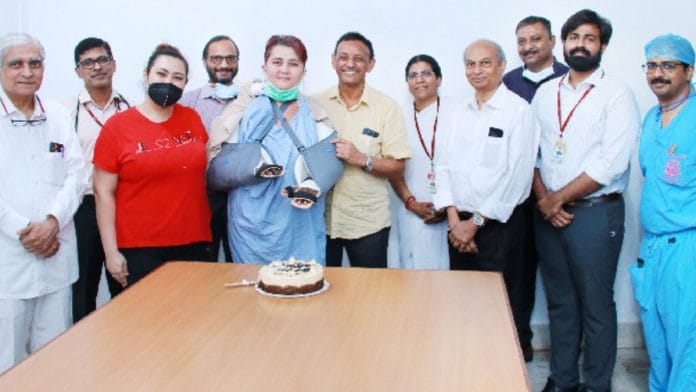New Delhi: The National Organ and Tissue Transplant Organisation (NOTTO), a national level organisation that serves as an apex centre for the procurement and distribution of organs and tissues in India, has decided to maintain a national registry of patients in need of hand transplantations. This is because the demand for this surgical procedure is rising in the country.
A notification issued by NOTTO said that all hospitals and centres are now required to register, on the organisation’s portal, the patients needing hand transplantation. The agency, in turn, will permit the procedure, based on the availability of cadavers for such donation, through a central allocation system.
ThePrint has seen a copy of the notification.
“So far, the hand transplantations conducted in hospitals were permitted by the NOTTO and its state counterparts but now, the procedure will be regulated centrally. This is aimed at streamlining the process and maintaining a central database of this surgery,” a senior NOTTO official told ThePrint.
A highly specialised surgery, the first hand transplantation in India was conducted in 2015 at Amrita Hospital, Kochi, on a 25-year-old patient who had lost both his hands in a train accident.
For a long time, this was the only centre in the country which offered the complex procedure.
But now, various hospitals in the National Capital Region of Delhi (Delhi NCR), including Amrita Hospital, Faridabad, and Sir Ganga Ram Hospital, select centres in Mumbai and Chennai, and Jawaharlal Institute of Postgraduate Medical Education and Research (JIPMER) in Puducherry, offer the procedure.
So far, India has seen 68 hand transplantations — one of the highest globally.
Also read: Focus on 113 home-grown, affordable medical devices to cut down import dependence, says govt
What organ transplantation entails
Bone marrow, solid organs like liver, heart, kidney, lung, small intestine, and pancreas, and composite tissues like hands and face are some of the organs and tissues which can be donated and received during organ transplantation.
Live donors may donate certain organs, but mostly, it is brain dead or deceased donors from whom organs are obtained for transplantation.
These transplantations are governed under the Transplantation of Human Organs & Tissues Act (THOTA), 1994, which “provides for regulation of removal, storage and transplantation of human organs & tissues for therapeutic purposes and for prevention of commercial dealings in human organs & tissues”, according to the Union Ministry of Health and Family Welfare.
Procedure and complications of hand transplantation
Hand transplantation is a complicated operation that can take 20 to 24 hours, and requires a team of highly trained specialists. Also, the donor has to be a brain dead person.
Once the donor hand is ready to be attached to the patient’s arm, surgeons first attach the patient’s bones to the bones of the donor hand using small metal plates, Dr Mohit Sharma, a plastic and reconstructive surgeon with Amrita Hospital, Faridabad, told ThePrint.
Special sutures are then used to attach the blood vessels, nerves and tendons. Once all parts of the donor hand and recipient arm have been attached, the skin is closed.
Sharma, who has performed a total of 32 hand transplants on 17 patients so far, further said hand transplantation can be done on a person needing a single hand too.
However, given the risk of follow-up lifelong therapy — in the form of immunosuppressants as in the case of other transplants — it is usually carried out in people who have lost both their hands.
Although not guaranteed, hand transplantation usually results in a recipient regaining some hand functions and sensations.
(Edited by Radifah Kabir)
Also read: With AIIMS Delhi set to train surgeons in face transplant, a look at the procedure & risks involved






